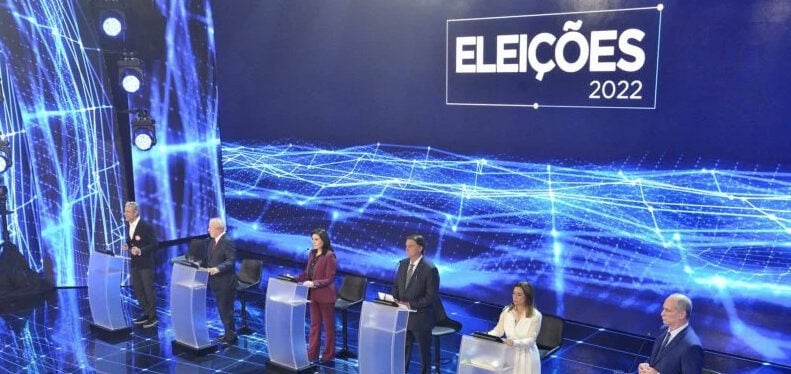After a long suspense, re-election candidate Jair Bolsonaro (PL) appeared in the duel with the PT leader, Luiz Inácio Lula da Silva (PT). But, for political analysts, they were not the protagonists of the debate, overshadowed by women (Simone Tebet from MDB and Soraya Thronicke from União Brasil) and Ciro Gomes (PDT).
ADVERTISING
The posts – in quantity – maintained the political opposition between the two politicians who lead the polls of voting intentions: Lula and Bolsonaro were the most mentioned in tweets during the event. (Estadão)
Datafolha
Senator Simone Tebet, candidate for MDB, had the best evaluation in the qualitative research carried out in real time by DataFolha. 43% of his statements were “good” or “great”, according to the 60 interviewees. In second place, Ciro Gomes (23%). Lula and Bolsonaro tied with 10% positive evaluations. The União Brasil candidate had 2% and Felipe D'ávila, 8%. The worst evaluation was from Jair Bolsonaro. The survey is not representative of the Brazilian population, and participants classified the candidates' answers to the debate questions on a scale of poor, fair, good and excellent.
Quest
According to real-time monitoring by Quaest Research and Consulting, Ciro Gomes led the positive mentions, (51%), followed by Simone Tebet (41%) who gained strength throughout the debate.
ADVERTISING
The largest number of negative mentions were directed to candidate Soraya Thronicke (União Brasil), followed by Luiz Felipe D'Ávila (Novo), according to Quaest.
Bolsonarism in data
According to monitoring done by Google Trends, the discussions at the event managed to increase the volume of questions asked in the Google about unfavorable terms to Jair Bolsonaro, as a “secret budget” and “a hundred-year secrecy”.
Evangélicos
União Brasil candidate Soraya Thronicke criticized the manipulation of religious faith, pointing to Lula and Bolsonaro. “We always said that the PT separated us in order to manipulate and maneuver everyone, this government is doing the same thing.”
Michelle Bolsonaro, first lady, has appeared in the Bolsonaro campaign to divert her candidacy from rejection among women. Its activities in the evangelical segment have also grown. Among the 20 posts by evangelical influencers with the highest engagement in the last 7 months, 18 were made by Michele on his only social media account, Instagram. Monitoring of publications was carried out by Casa Galileia.
Attack on journalist
The networks, as well as the other participants in the debate, did not forgive Bolsonaro's attack against Vera Magalhães, when the journalist asked Ciro about vaccination, citing facts that displeased the president. “I think you sleep thinking about me, you have some passion for me, you can't take sides in a debate like this.” This Monday (29), lawyer Rafael Logoun defended Bolsonaro’s reaction to “embezzlement” of the journalist. On Jovem Pam's Morning Show, he calls Vera a “little activist dressed as a journalist”, and says that Bolsonaro's response defines what “feminism is”.
Philip, who?
The candidate for the Partido Novo, Luiz Felipe D'Ávila, has not yet managed to reverse the public's lack of knowledge about him. At the Google, the search for his name is 30 times lower than that of the candidate from the same party in 2018, João Amoêdo, even without appearing on TV.
By defending privatization and agriculture, D'Ávila became the subject of memes.

Representativeness
On social media and also in person, around the TV Bandeirantes studio, protests against the absence of black people, indigenous people, and other candidates for the presidential election further fueled the political debate this Sunday (28). On Twitter, Internet users questionwhy issues such as police violence, incarceration, indigenous lands and others were not raised neither by candidates nor by journalists, who, for the most part, are white.
- Debate: with memes and shack scenes, Twitter competed with TV (Folha de S.Paulo)
- Bolsonaro's campaign calls into question the upcoming debates(The globe)
- Debate exposes weaknesses of Lula and Bolsonaro without changing the game (Folha de S.Paulo)
- Analysis: Tense, Lula and Bolsonaro did not win (The globe)
- See the photos of the presidential candidates that will be displayed at the polls (Folha de S.Paulo)
- During the debate, Ciro and Tebet were the ones who had the most positive mentions (State of Minas)



